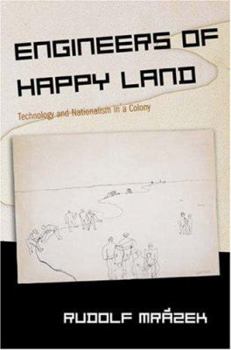Engineers of Happy Land: Technology and Nationalism in a Colony
Select Format
Select Condition 
Book Overview
Based on close reading of historical documents--poetry as much as statistics--and focused on the conceptualization of technology, this book is an unconventional evocation of late colonial Netherlands East Indies (today Indonesia). In considering technology and the ways that people use and think about things, Rudolf Mr zek invents an original way to talk about freedom, colonialism, nationalism, literature, revolution, and human nature.
The central chapters comprise vignettes and take up, in turn, transportation (from shoes to road-building to motorcycle clubs), architecture (from prison construction to home air-conditioning), optical technologies (from photography to fingerprinting), clothing and fashion, and the introduction of radio and radio stations. The text clusters around a group of fascinating recurring characters representing colonialism, nationalism, and the awkward, inevitable presence of the European cultural, intellectual, and political avant-garde: Tillema, the pharmacist-author of Kromoblanda; the explorer/engineer IJzerman; the "Javanese princess" Kartina; the Indonesia nationalist journalist Mas Marco; the Dutch novelist Couperus; the Indonesian novelist Pramoedya Ananta Toer; and Dutch left-wing liberal Wim Wertheim and his wife. In colonial Indies, as elsewhere, people employed what Proust called "remembering" and what Heidegger called "thinging" to sense and make sense of the world. In using this observation to approach Indonesian society, Mr zek captures that society off balance, allowing us to see it in unfamiliar positions. The result is a singular work with surprises for readers throughout the social sciences, not least those interested in Southeast Asia or colonialism more broadly.Format:Paperback
Language:English
ISBN:0691091625
ISBN13:9780691091624
Release Date:March 2002
Publisher:Princeton University Press
Length:336 Pages
Weight:1.05 lbs.
Dimensions:0.8" x 6.1" x 9.3"
Customer Reviews
1 rating
a brilliant work with outstanding originality
Published by Thriftbooks.com User , 18 years ago
Some experts call Walter Benjamin's 1000-plus page magnum opus The Arcades Project (Cambridge: Belknap/Harvard 1999) quite simply one of the greatest 20th century efforts to comprehend "History". Some even call this thick tome the greatest endeavour of all studies into one of the most fundamental perceptions in 2500 years of world development: a perception arising from awareness of the way the relationship between limited humanity and unlimited time dictates human life. Inspired by various sources, particularly Marcel Proust and Martin Heidegger, Mrázek does something nearly similar to Benjamin. Mrázek, an expert on modern Southeast Asian history who was born in the Czech Republic and later moved to America, achieves it in this book. The Arcades Project excavated bits of debris and `re-built' vanished 19th century Paris - then the world capital - and in so doing , offered fragments of dreams (with its interpretations) of a continent, an era. Mrázek examines Indonesia at the end of Dutch colonial rule, and from this offers an exciting alternative in studying nation, identity and culture in the 20th century. If The Arcades Project - sabotaged as it was by World War II - appeared more like a vast montage or commentary on a number of books than a whole book in itself, Engineers of Happy Land is a book that had enough time to become a fine composition, with a structure and a form of writing that appear deeply considered. Mrázek organizes the book into six large chapters. The first, titled "Language as Asphalt" is about the technology of moving and expansion, movement and speed. The second chapter is titled "Towers", marking nicely the change of subject from constructions spread out horizontally to constructions erected vertically. The last chapter is titled `Only the Deaf Can Hear Well'. This chapter centres around Pramoedya Ananta Tour, a figure whose life story is clearly not as a statesman or an engineer, but who boomed out modernity and nationalism. He built Indonesian nationalism not with mechanical equipment, but with linguistic tools: with the novel, short stories, essays and letters. In Pramoedya's lifestory and the events that befell him in exile, Mrázek provides an example of the life of struggle of a nation deeply wounded in gaining its independence. Pramoedya's greatness does not arise from his position as an innocent victim, with selective memory, stubborn-headed and deaf from a pistol-butt strike. The epilogue invites the reader to `leap' to the present, to Pramoedya who in his twilight years ponders the passing of time; and in so doing threads together all the previous chapters, from colonial consolidation to the emergence of independence. This time, spiritual independence. Mrázek structures his book as an engineer builds an integrated circuit: each section supports the others and their connection sparks ideas. Or, like a sensitive poet aware of the power of space between juxtaposed images that appear momentarily without inte





